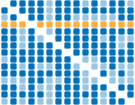Yeats, William Butler: The Municipal Gallery Revisited
The Municipal Gallery Revisited (English)
Around me the images of thirty years: An ambush; pilgrims at the water-side; Casement upon trial, half hidden by the bars, Guarded; Griffith staring in hysterical pride; Kevin O'Higgins' countenance that wears A gentle questioning look that cannot hide A soul incapable of remorse or rest; A revolutionary soldier kneeling to be blessed;
An Abbot or Archbishop with an upraised hand Blessing the Tricolour. 'This is not,' I say, 'The dead Ireland of my youth, but an Ireland The poets have imagined, terrible and gay.' Before a woman's portrait suddenly I stand, Beautiful and gentle in her Venetian way. I met her all but fifty years ago For twenty minutes in some studio.
Heart-smitten with emotion I Sink down, My heart recovering with covered eyes; Wherever I had looked I had looked upon My permanent or impermanent images: Augusta Gregory's son; her sister's son, Hugh Lane, 'onlie begetter' of all these; Hazel Lavery living and dying, that tale As though some ballad-singer had sung it all;
Mancini's portrait of Augusta Gregory, 'Greatest since Rembrandt,' according to John Synge; A great ebullient portrait certainly; But where is the brush that could show anything Of all that pride and that humility? And I am in despair that time may bring Approved patterns of women or of men But not that selfsame excellence again.
My mediaeval knees lack health until they bend, But in that woman, in that household where Honour had lived so long, all lacking found. Childless I thought, 'My children may find here Deep-rooted things,' but never foresaw its end, And now that end has come I have not wept; No fox can foul the lair the badger swept --
(An image out of Spenser and the common tongue). John Synge, I and Augusta Gregory, thought All that we did, all that we said or sang Must come from contact with the soil, from that Contact everything Antaeus-like grew strong. We three alone in modern times had brought Everything down to that sole test again, Dream of the noble and the beggar-man.
And here's John Synge himself, that rooted man, 'Forgetting human words,' a grave deep face. You that would judge me, do not judge alone This book or that, come to this hallowed place Where my friends' portraits hang and look thereon; Ireland's history in their lineaments trace; Think where man's glory most begins and ends, And say my glory was I had such friends.
|
Viszontlátás a Municipal Galleryben (Hungarian)Harminc év képei köröskörül: egy rejtek; vízparton zarándokok; ablakszárny, tárgyalás, rácson kivül őrség; Griffith szeme eksztázisban lobog; O'Higgins arcán egy kérdés feszül, szelíd lelkéről elárulja, hogy bűnbánó s megtört nem lehet soha; áldáshoz térdelt forradalmár katona.
Egy érsek vagy apátúr ünnepélyesen megáldja zászlónkat. „Ez – mondanám – nem ifjuságom holt Írországa, hanem a költők elképzelte szörnyű és vidám." Egy hölgy-arckép előtt megállok hirtelen. Velencés módon szép s finom. Talán húsz percig is, vagy ötven év előtt, egy műteremben már bámultam őt.
Érzelmek szívenszúrt áldozata, behúnyom gyógyulásért a szemem; bármerre néztem, mind azokat a maradandó s futó bálványaim lelem. Augusta Gregory: nénje fia. S ezek „egyetlen nemzője" Hugh Lane; Hazel Lavery élve-halva: oly eset, mondhatta volna egy balladaénekes;
Mancini-portré A. Gregorytól, „Rembrandt óta nagyobb nem volt" John Synge szerint; életerős, nagy-portré, ámde hol az ecset, mely mutatna valamit gőg és alázat ily csodáiból? S nagyjainkból – ez fájón arra int – bár az idő bevált kliséket felmutat: soha újra saját kiválóságukat.
Térdem középkori, valóban jól magát csak rogyva érzi; de nőm oldalán tisztes hajlékban mindent megtalált. S véltem gyermektelen: „Gyermekeim talán gyökérre lelnek ott." Korai volt e vágy. S most jő a vég, de könnyem egy se hullt; nem piszkít róka borz-sepert odút
(Spenserből való és köznyelvi kép}. John Synge, én s Augusta Gregory, vallva, hogy minden tettünk, szavunk s dalunk valamiképp egy kell legyen a földdel, mert csak így Anteuszul lehet életerős és ép: korunkban mi hárman valánk azok, kik mindent újra e mértékre vettek, mely álma volt koldusnak és nemesnek.
S itt van John Synge, ez a tősgyökeres; ,,emberi szót felejtett" komor arc. Ki megítélnél engem, ne keress könyvekben itt-ott: e szent helyre tarts, s szemed barátaim képére vesd; vonásaikon Írország története, a harc, s lásd, hol az emberi érdem kezdete s vége, s mondd: ily barátaim az érdemem, egyéb se.
|




